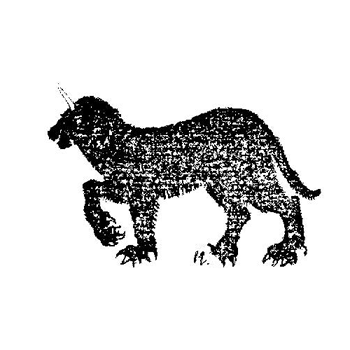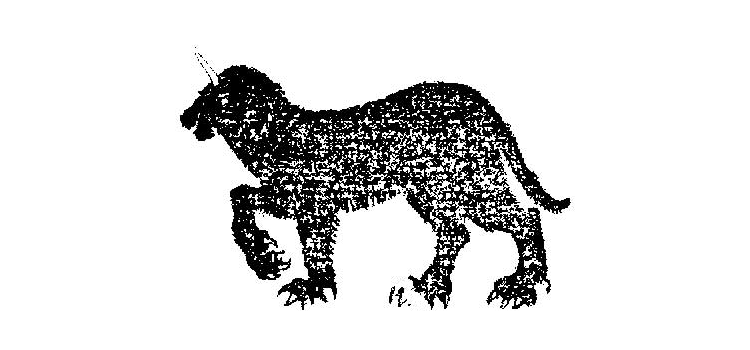Like a wolf on the fold.
He had always believed in the black dog.
He had heard, as a child, of its depredations. Of how it stole away those who were too old and infirm, or too young and naïve, to cry out before they were snatched up in its jaws. Of how it did not even need to do that: even its poisoned breath was enough to ensure that sleepers would never wake. Of how it crept through the dead of night, its velvet footsteps falling softer than snow, its breath smoking in the chill air, its form shrouded by darkness but for the red of its eyes and the white of its teeth. He had learned to be afraid, with a child’s unquestioning belief.
And he had learned, as an adult, how to invoke the black dog’s power. The fear remained, but became deeper, more complex, more intimate. People swore by it and cursed at it; they begged its indulgence and asked its forgiveness; they wished it upon their friends in jest and their foes in earnest. They spoke of it as a faithful companion, an eternal enemy; a fell beast and a fever dream. But like the children they had once been, they believed in it absolutely; and yet they believed it would never come for them.
The black dog was rarely seen, and its witnesses were unreliable – sots, dotards and infants, in the main – and the suspicion was that they sought attention for themselves rather than speaking the truth. Occasionally, their testimony had the ring of truth; even more occasionally, it coincided with the discovery that a victim had been taken in the night. But even then, it was often difficult to tell if the sighting had prefigured or post-dated the discovery. And so some of the people came to believe that the dog was perhaps more spectre or symbol than flesh and blood.
They argued that it was needless for the congregation to huddle fearfully in the crossed arms of the church through the long winter nights: that the muttering of prayers and the trailing fumes of incense amounted to little more than insipid superstition unbecoming of their race. They scoffed at the long clawmarks in the church door; they mocked the priest’s talk of the devil playing games with shapes. Their ancestors, and their ancestors’ ancestors before them, had spoken of the black dog: what safety could the upstart from Palestine provide against such ancient evil?
To keep the peace — and to be doubly sure — the people began tethering a sheep outside overnight; but when morning came, they more often found its corpse frozen than gnawed. And when it had been taken by violence, the marks were those of a wolf; sometimes a bear. And the shepherds began to grumble that the preacher talked of protecting flocks inside the church even as they sacrificed theirs outside it. And so, in time, that practice, too, came to an end, and the people merely barred the door of the church and fed the fires that kept them warm through the night.
But it was a hard winter that year.
The first deaths were few and far between, and while mourned, did not give rise to general alarm, beyond some remarks upon the unexpectedness of the passings, of the marks that disfigured the departed. But it was not until the trickle of deaths broadened into a stream that people started to talk of the black dog: first in whispers, then in murmurings. The priest began to speak of unseen adversaries, but words rang hollow in their ears. Sheep began, once again, to be tied outside the church.
He watched all this with detachment. He did not know if the black dog had returned; he did not care. He had always believed in the black dog, but for him, it was a question of surviving the night. He was strong; he was alert; he was hale and hearty. If the black dog came, then he would fight it. If it did not, he would not think of it.
But the dog did not come for him.
It came, instead, for his mother, who did not wake, one morning, to stoke the fire. It came for his sister, who did not break bread, one morning, to feed her family. It came for his daughter, who did not shout, one morning, to greet the dawn. And it came for his wife, who did not turn, one morning, into her husband’s arms.
In his grief, he stood numbly by as the people peered at the door, looking for fresh marks. He stood by as they cried and shouted and argued, as the priest alternately prayed and preached and chastised, as the shepherds cast lots to decide whose sheep to give up to the black dog. And as he stood by, his grief smouldered and kindled and burst into a perfect effulgence of rage.
The night came. The people barred the church door.
He remained outside, wrapped in his robes.
And he waited for the black dog.
And he waited. The stars became hard and brilliant, but he waited, motionless, watching his breath cloud the moonlight. And the longer he waited, nursing his anger, the more he felt of a piece with the night. He felt as though it was his home. Like the dog, he thought. The dog was of a piece with the night. And then he started to think that perhaps there was no dog. Perhaps there was only him and the night. Or perhaps there was only him. Perhaps he was the night, the black dog. Perhaps he was the curse on the people, his family. And after a while, he could no longer tell where the black dog ended and where he began.
But later, much later, he saw the smoke of breath in the air, though the black dog remained hidden among the trees. And so he ran, crying out, screaming out, into the darkness, into the night, calling its name, the blood flowing into his eyes and his arms and his heart; but he was heedless, exulted in it, wished that he had more blood to give if only that would sate the beast; and in his rage he tore and kicked and struck out with his fists.
And he did not know, or care, if he won or if he lost. It mattered only that he fought. ##


Loosely inspired by this. And this.